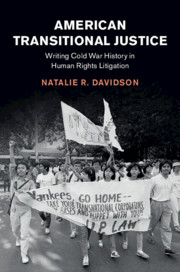(Source: CUP)
Cambridge University Press is
publishing a new book on Alien Tort Statute litigation (US) during the Cold War.
ABOUT THE BOOK
Natalie Davidson offers an
alternative account of Alien Tort Statute litigation by revisiting the field's
two seminal cases, Filártiga (filed 1979) and Marcos (filed 1986), lawsuits
ostensibly concerned with torture in Paraguay and the Philippines, respectively.
Combining legal analysis, archival research and ethnographic methods, this book
reveals how these cases operated as transitional justice mechanisms, performing
the transition of the United States and its allies out of the Cold War order.
It shows that US courts produced a whitewashed history of US involvement in
repression in the Western bloc, while in Paraguay and the Philippines the
distance from US courts allowed for a more critical narration of the lawsuits
and their underlying violence as symptomatic of structural injustice. By
exposing the political meanings of these legal landmarks for three societies,
Davidson sheds light on the blend of hegemonic and emancipatory implications of
international human rights litigation in US courts.
ABOUT THE AUTHOR
Natalie R. Davidson, Tel-Aviv
University
Natalie Davidson is a Lecturer in
the Faculty of Law at Tel-Aviv University. She has published about Alien Tort
Statute litigation, feminist interventions in international law, the prohibition
of torture, and interdisciplinary methodology.
TABLE OF CONTENTS
1. Introduction. Revisiting the
Gilded Age of transnational human rights litigation in US courts
2. Alien tort statute litigation
in legal practice and the legal imagination
3. 'Foreign torture, American
justice': Filártiga in the United States
4. Filártiga in Paraguay
5. Narrating the Marcos regime in
US courts
6. The Marcos case and
transitional justice in the Philippines
7. Conclusion.
More info here


No comments:
Post a Comment